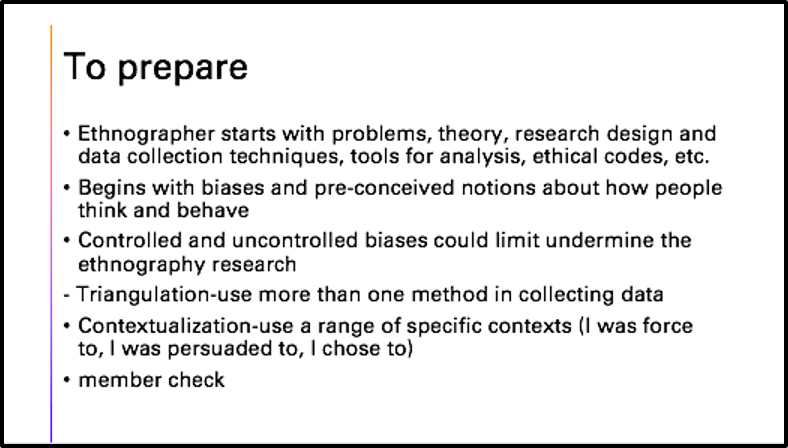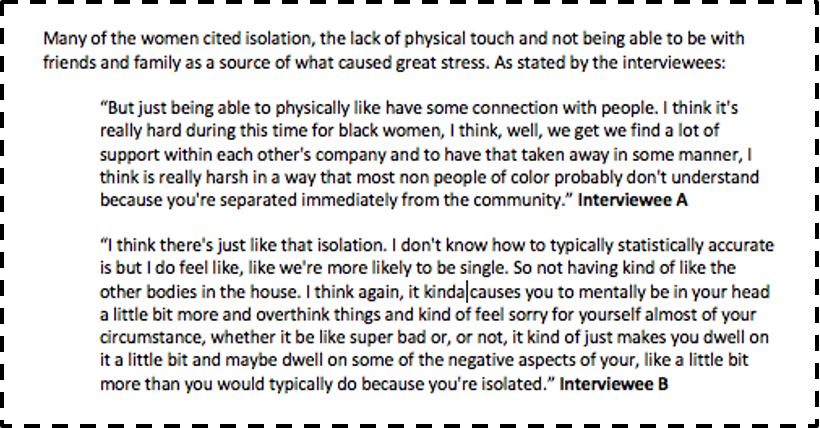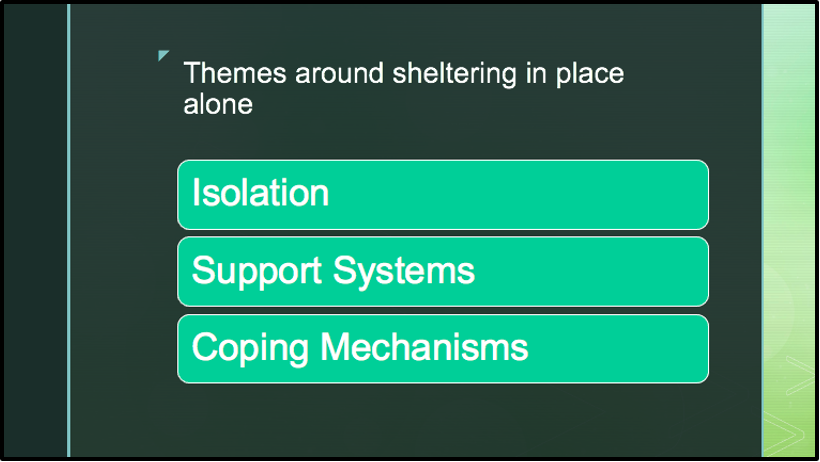Conducting Online Ethnographies During the COVID-19 Pandemic
Member Institution
Howard University
Case Study Lead(s)
Wei Sun, Ph.D.
Project
Field Research in Communication
Executive Summary
Field Research in Communication is a graduate-level communications course aimed at instructing students on how to conduct virtual ethnography using technology as a primary methodological instrument. To better understand the online environment and produce meaningful ethnographies, students use technical tools to collect and analyze data in the field. Field research, which is traditionally a real-time, “on-the-ground” approach, has transitioned online for this course during Fall 2020 semester.
What is Virtual Ethnography?
Simply put, virtual ethnography, more commonly known as online ethnography, is the process of conducting ethnographic fieldwork in an online environment. Ethnography is a qualitative research methodology that involves the study of cultural phenomena from the vantage point of the subject(s) under study. It centers the insider’s point of view through close examination of the behaviors and thoughts of participants. The researcher relies on participant observation to gain an insider understanding of the people and social interactions that are being studied. Virtual ethnography can use various internet sites to conduct research, including: newsrooms, chat forums, and social media platforms. It may also involve the use of video conferencing tools for interview and focus group discussions.
Course Structure
All students in the class conducted online ethnographic research centering the experiences of underrepresented/marginalized groups during the COVID-19 pandemic as well as issues surrounding the political unrest of 2020. Students are largely investigating their research topics within African American populations across socioeconomic groups, focusing on the concerns of lower socioeconomic individuals and communities. Students are each asked to develop an original topic and their own ethnographic instruments (questionnaires). Their work will culminate in a final research paper to be presented in class.
Given the current state of events surrounding the COVID-19 pandemic, universities around the country have moved courses and other institutional activities to virtual platforms, requiring most instructors to creatively amend their course structure. Field Research in Communication (FRC) will provide students with the opportunity to collect ethnographic data through online interviews and conduct real-time observations that do not require direct interaction with the subjects. The course has three main objectives:
- Identify the online culture and environment.
- Critically engage a broad range of social and cultural issues.
- Offer recommendations impacting racial and ethnic minority communities.
Before conducting fieldwork and applying ethnographic methods in their own projects, students must adopt the positional lens of an observer, preparing to focus on the relevant cultural context and patterns in human behaviors and thoughts. The course instructs on how to perform fieldwork research through a series of steps.


1. Identify the Problem
The researcher must select a topic of interest.
2. Select a Theoretical Lens
Theory is critical for guiding a research practice. Whether explicit or implicit, a study must include an underlying theoretical approach that helps to frame the problem and define how to address it.
3. Determine the Research Design
A research design typically combines elements of information including background literature, rationale, methodology, significance, project timeline, and a budget presented in the form of a proposal. In an ethnographic research design, fieldwork is the most critical element.
4. Methods and Data Analysis
Conducting fieldwork requires observing, asking, and writing. The researcher is responsible for cross-checking and comparing the data that is collected and then reporting it in a final product.
5. Code of Ethics
A standard of ethics associated with human subjects research should be upheld by explaining the researcher’s role as an ethnographer and member-checking to ensure an accurate representation of the subjects’ perspectives and behaviors.
“The Impact on Single Black Women Sheltering-in-Place Alone During a Pandemic”
by Dana Williams-Johnson, fall 2020
The Problem
There has been a lack of focus on the ways that single Black women cope during a crisis such as the COVID-19 shelter-in-place order. Understanding how they maintain their well-being during a pandemic can help to guide future research on Black women and on stress.
Research Questions:
- What effect has the pandemic had on the mental health of single Black women?
- What are the unique challenges single Black women face during the pandemic?
- What are the coping mechanisms single Black women have employed during the pandemic?
Theoretical Lens
Intersectionality: a framework for understanding how a person is subjected to different forms of discrimination and oppression based on the “intersection” of their individual characteristics such as race, class, gender, and sexuality. (Kimberlé Crenshaw, 1989)
Fieldwork
For this project, the researcher interviewed a sample of four Black women between the ages of 32 and 42 who were college-educated professionals. Each participant had been sheltered-in-place alone for five months or more and resided in a major city: New York, Atlanta, or Washington, D.C. The researcher conducted virtual interviews with each of the four participants, observing them in their home environments, asking questions about their shelter-in-place experiences, and writing participant responses as verbatim quotations from their personal perspectives. The researcher identified any significant themes that could be found in the fieldwork data based on participant responses. These notes and transcriptions were documented and submitted in the form of a fieldwork report and final PowerPoint presentation.




Conclusions and Findings
Through this ethnographic study, the researcher found that the COVID-19 pandemic affected single Black women in a number of ways.
Increased isolation from their social network, a lack of physical interaction, and anxiety over the fear of family members contracting the virus all took a toll on the participants’ mental health.
To deal with the stress of the pandemic, participants resorted to various coping mechanisms. Some involved overeating and increased alcohol consumption, while others included reading novels, meeting with a therapist, and re-watching familiar television shows. The participants also relied heavily on their friends and family as support systems, communicating with loved ones through phone calls, Zoom, and FaceTime.
The single Black women who participated in this ethnographic study provided insight into the impact of the pandemic on members of a particular subgroup of the American population.
1. There are sampling limitations involved in virtual ethnography.
Reaching target demographics who have limited access to technological resources (for example, homeless populations, elderly populations, and families unable to access or afford technology) is a challenge and potential limitation for this course as conducting online ethnography is the primary objective. Possible solutions for this digital divide include identifying a community center that can provide space and technology resources such as phones or computers. The accessibility of these centers, however, may not be guaranteed. The feasibility of selecting certain target samples should therefore be considered.
2. Submitting a joint-class IRB application is advantageous.
Because this course project involves interviewing human subjects, Institutional Review Board (IRB) approval of research is required. For this course, one IRB application including all student topics and data collection instruments is submitted by the instructor as the principal investigator, on behalf of the class, under the singular umbrella topic of “COVID-19 and its Impact on Marginalized Communities.” As with any IRB application process, the approval timeline can pose a challenge, but if students opt to develop their projects into their dissertation research or produce a publication from their research, IRB approval would be required in any case. Therefore, obtaining IRB approval within the course can be beneficial.
3. Semester projects must be appropriately scaled.
The semester timeline can potentially conflict with the type of projects students would like to accomplish. As a result, projects must be scaled so that they can be completed within a reasonable and realistic time frame. If, for any reason, IRB approval is not granted, students will need to modify their projects. For example, students may collect primary data that involves the observation of human subjects rather than direct interaction with them. Alternatively, students may collect ethnographic data from publicly available online sources. Either of these options could enable students to fulfill the objectives for the course and execute meaningful qualitative research that does not violate IRB guidelines.
4. Students are encouraged to maintain updated research certifications.
As a component of the class, students must provide up-to-date certifications in Responsible Conduct of Research (RCR) and other Collaborative Institutional Training Initiative (CITI) training as well as provide detailed information about the types of human subjects and questions they will be using in their projects. Requiring students to receive their RCR certification as a prerequisite for the course and securing IRB approval prior to the start of the semester would reduce time conflicts. RCR certifications are already required for all graduate students and should therefore be encouraged to be completed or renewed as early as possible.
5. The course may be offered in a hybrid format in the future.
Returning to an in-person format would be ideal for future semesters as it would give students the chance to conduct their fieldwork live and in real time with fewer methodology limitations. However, the relative effectiveness of the virtual format will likely allow it to be an option for the course in the future. Courses like Field Research in Communication-Virtual Ethnography that involve the intersection of communications, social phenomena, and digital spaces are critical, especially in the midst of a global pandemic.
